Not just kampung durian: Varieties grown by Selangor's indigenous communities enter the fray
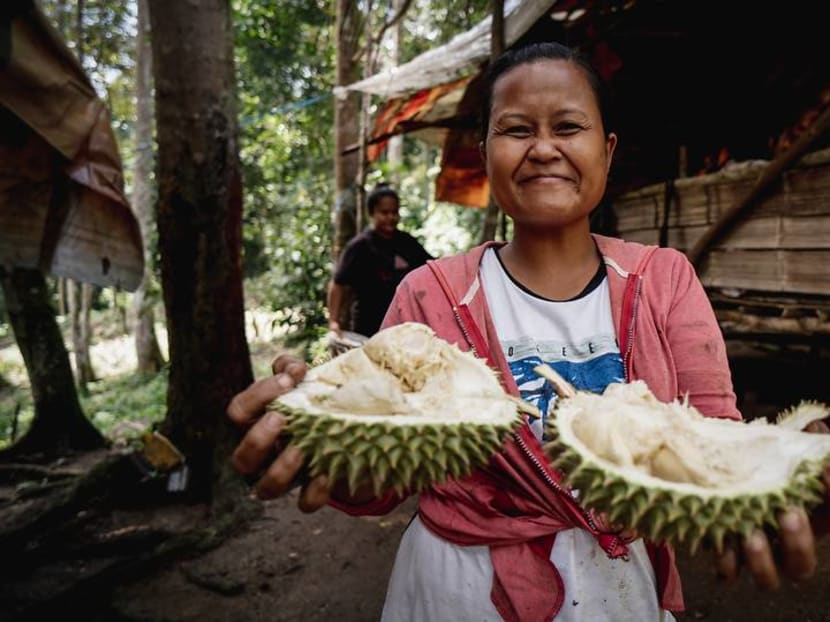
Sarah, one of the orang asli growers who supply durians to Biji Bumi Durian. (Photo courtesy of Native)
KUALA LUMPUR: There are durian daun - literally leaf durians - that fit snugly into a person’s palm, with spikes that are flexible and less menacing to the touch.
The pulp comes in an orange hue and its flavours are said to be reminiscent of banana and cempedak, quite unlike a typical durian.
There are also durian batu, or rock durians, yielded from a particular tree grown on a rock in a Selangor forest, where an orang asli or indigenous community roam and forage.
For the uninitiated, durians coming from the forests are often dismissed as the generic kampung durians. As the less-celebrated variants of the thorny fruits, they attain few accolades compared to their well-known cousins like Musang King or D24.
But the indigenous growers in Hulu Selangor, a district in the northeast part of Selangor, beg to differ.
“Many people do not know much about durians from the forests. They only call them ‘forest durians’ and could not differentiate the types,” Yee Kuat, a member of the Temuan tribe who wished to be known only by his given name, told CNA.
The 32-year-old father of four is the chairman of the indigenous village committee. A local entrepreneur, he deals mainly in durians. For this current season, he supplies durians from his village and orang asli communities nearby to Biji Bumi Durian, an offshoot of tourism-based social enterprise Native.
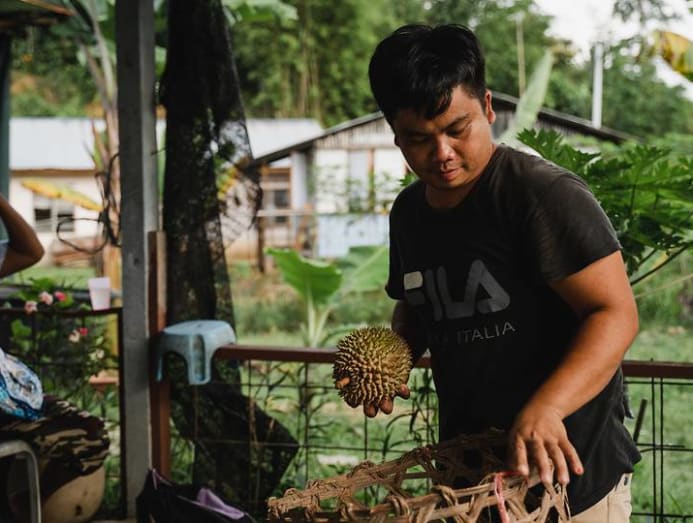
Founded by Daniel Teoh, Native co-creates tourism activities and businesses with several orang asli communities in Selangor. Teoh is one of the grant winners of the Singapore International Foundation's Young Social Entrepreneurs in 2019.
Biji Bumi, translated as seeds of the earth or fruits of the land, brings durians from the indigenous communities to consumers in the Klang Valley. Since its launch in early July, it has sold more than 600kg of durians to people curious to give the varieties a try.
READ: Malaysia's indigenous tribes fight for ancestral land and rights in a modern world
The initiative could not have come at a better time. As the pandemic disrupted lives and halted movements, the orang asli communities were not spared from the impact as well.
Under normal circumstances, some of them would be setting up makeshift durian stalls near their villages when harvest is bountiful. But this is now impossible due to the pandemic that has started to rage since last year.
“Biji Bumi has been of great help at the time of a pandemic. It has helped orang asli a lot to sell our fruits,” Yee Kuat said.
SUN DURIAN AND GRANDFATHER DURIAN
The durians were initially offered as just kampung durians via Native midway through the season in July last year.
“One of the communities Native works with is big on durians. They have a forest filled with durian trees. Every season, they would call and invite us to visit and have some durians,” Teoh, 27, told CNA.
“But when the pandemic hit, they asked if we wanted to buy their durians,” said the civil engineering graduate.
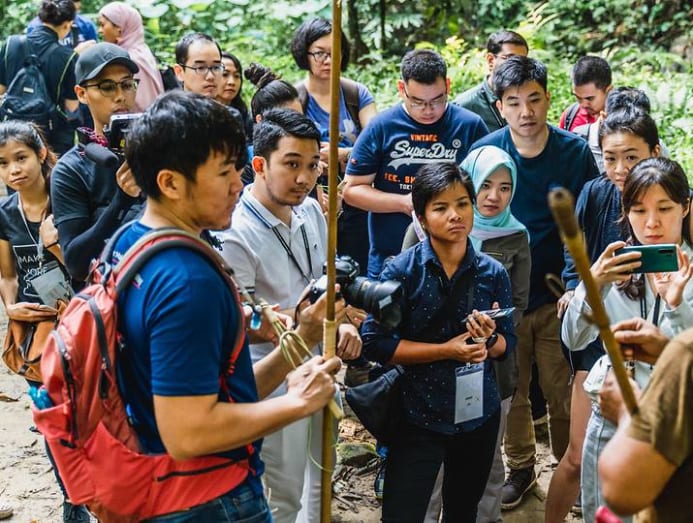
Slightly over one tonne of durians were sold, and Teoh and his team were emboldened to create the Biji Bumi Durian brand.
“Last year, we sold everything as kampung durian, but we realised that the villagers have individual names for the durians and we found it really interesting.
“They saw us as outsiders being a friendly party and they charged us a flat fee, but it turns out that they do have this whole grading system - what do the durians mean and how much do they worth.
“We really wanted to acknowledge and showcase this because it’s part of the orang asli heritage,” Teoh said.
READ: Isolated and short of supplies, Malaysia's indigenous groups depend on aid to ride out movement control order
In addition to durian daun and durian batu, Biji Bumi Durian also lists durian matahari (sun durian) and durian atuk atuk (grandfather durian) on its website.
Named such because of the deep yellow flesh, the sun durians are described as sweet, creamy and slightly bitter, similar to the flavours of IOI durian. The grandfather durians, meanwhile, pays tribute to the indigenous community’s centuries of ancestry, and have sweet, thick and creamy sensations.
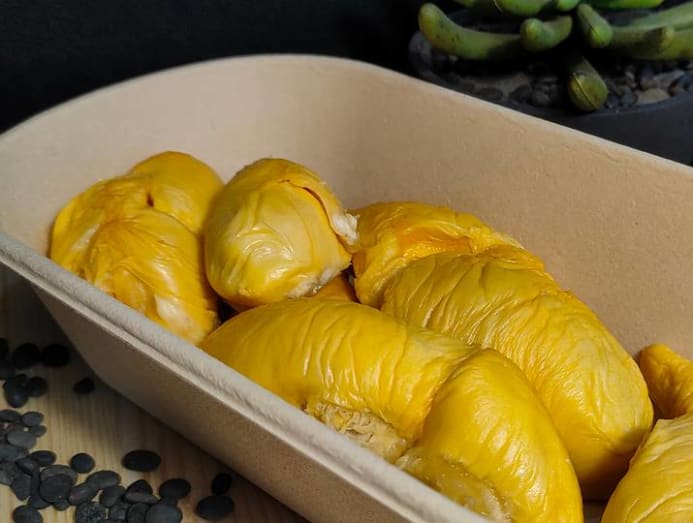
Photos on Biji Bumi Durian’s social media posts educate people of more durian names. There are durian sompo with hook-like thorns, as well as durian bukit (mountain durians) that are sometimes referred to as the “communist durians” because many of such trees took root during the communist insurgency era.
“The communists would eat the durians from the forest that was maintained by the orang asli as they walk through it, and throw the seeds on the ground after they were done, which was how many of the trees were cultivated,” one of its Facebook posts read.
These anecdotal - and sometimes whimsical - stories were shared by the orang asli when visitors went for hikes in the jungle to see the durian trees, Teoh said.
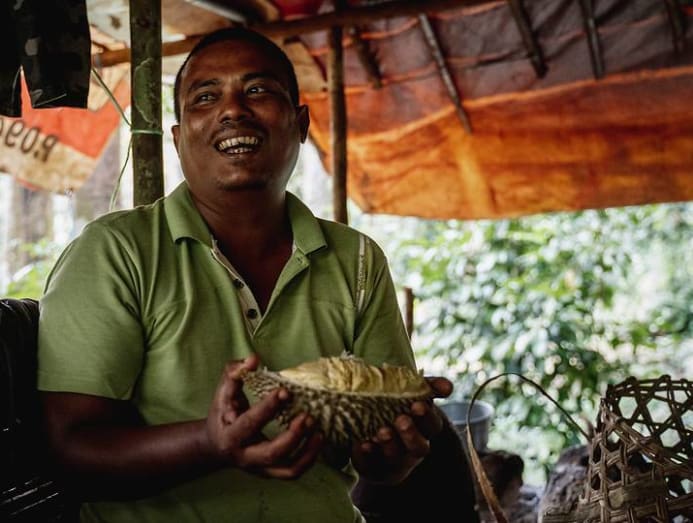
"There’s also a durian ketam (crab), which belongs to Jais, another grower. He said he found a crab inside one of the durians from this tree, and that’s why he named it this way.
“We said it’s not possible but he insisted that it’s true,” Teoh said.
FAIR PRICING
While some of the durian trees might have been native to the forest, many were believed to be planted by the nomadic indigenous people over the years.
“Most of the orang asli would say, my grandmother gave the trees to me.
“I can’t speak for all orang asli, but for this community, the land is divided among the first settlers. Whichever families showed up, they owned a certain part of the land. There are markers, such as rubber trees, as informal acknowledgments of ownership,” Teoh explained.
These days, the tribe lives at the fringe of the forest and would sleep in the forest during the durian season.
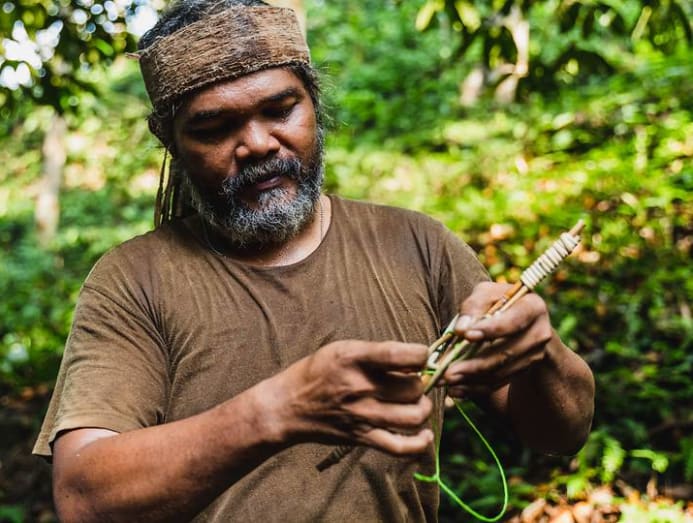
READ: 'I hope it makes them a little happier' - Durian seller offers free meals to Malaysians, taxi drivers in Singapore
To take care of the trees, they scatter ashes on the ground as fertiliser and tie zinc sheets to the trunks to deter small animals from climbing the trees, according to Teoh.
“It’s all natural, without (commercial) fertiliser,” Yee Kuat said.
Middlemen would show up and offer RM4 (US$0.95) or RM5 per kilogram for all the durians from the forest. Biji Bumi Durian, meanwhile, works out the pricing with the community.
“We ask them how rare the durian is, how many do they have and how long does it take to do all the work to generate the fruits. From there we ask them what’s the fair price.
“A tauke (boss) will buy everything but at RM4 per kilogram. We offer an option where the orang asli get a higher valuation but we can’t take everything they have just yet because we are a new brand,” Teoh explained.
The encouraging response so far is perhaps an indicator that these durians from the forest will draw a loyal following, with the right promotion and marketing. Biji Bumi Durian is aiming for 5 tonnes of transactions this season, which could last between 60 and 90 days.
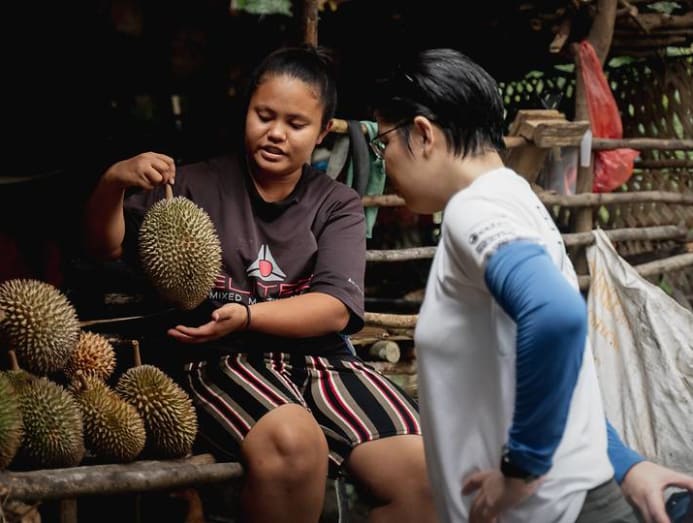
Aside from the 10kg whole durian pack, the durians are delivered to customers in plant-based boxes, packed by the orang asli growers.
Biji Bumi Durian’s immediate objective is to change what people think about kampung durians. “They are better than Musang King. Cheaper and better. That’s what I would love for people to say,” said Teoh.
Yee Kuat has similar aspirations. “I hope Biji Bumi Durian will make orang asli durians more well-known. Orang asli always tries to interact with other people, we want to introduce our fruits from the forests. In fact, we have even more good ones,” he said.





